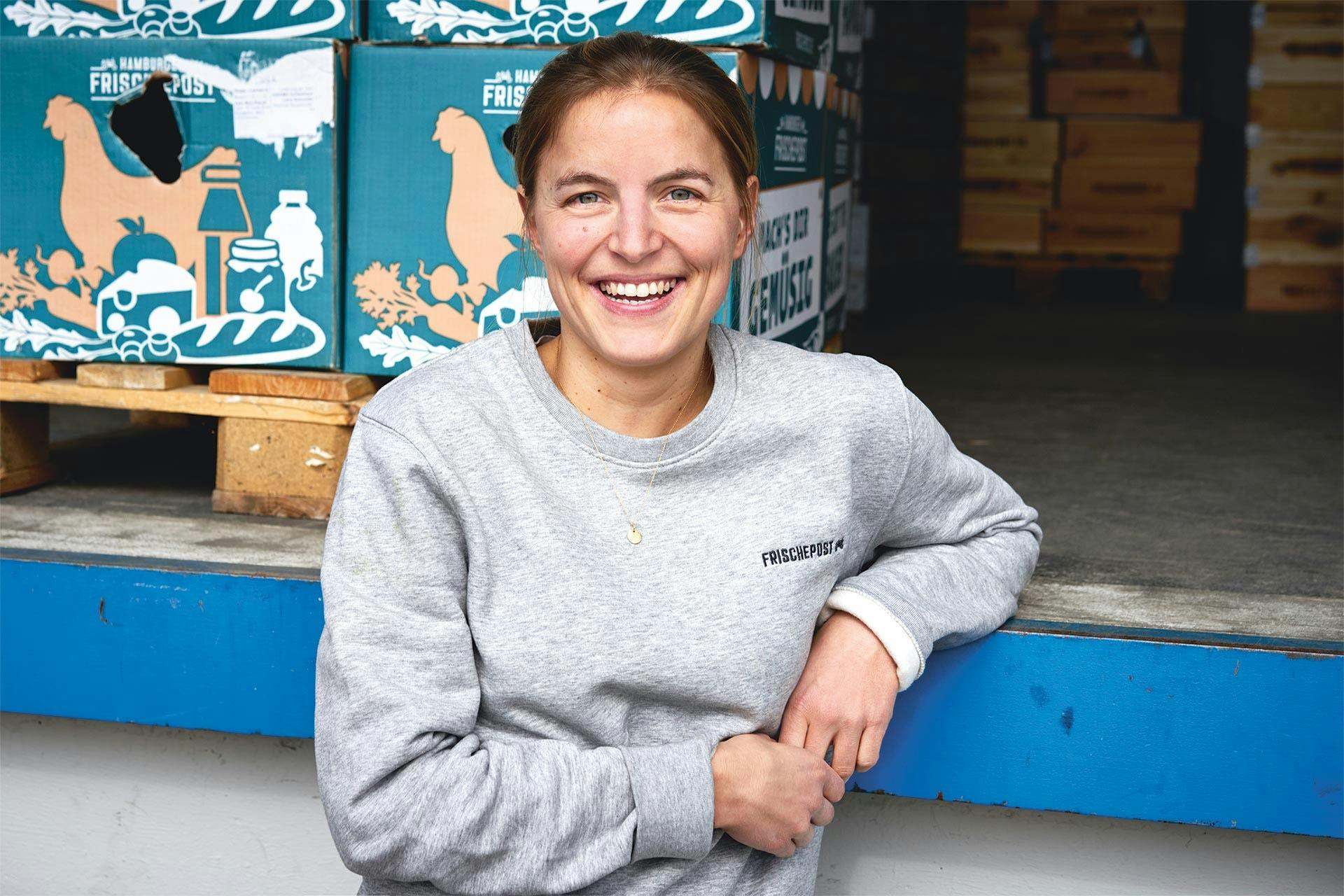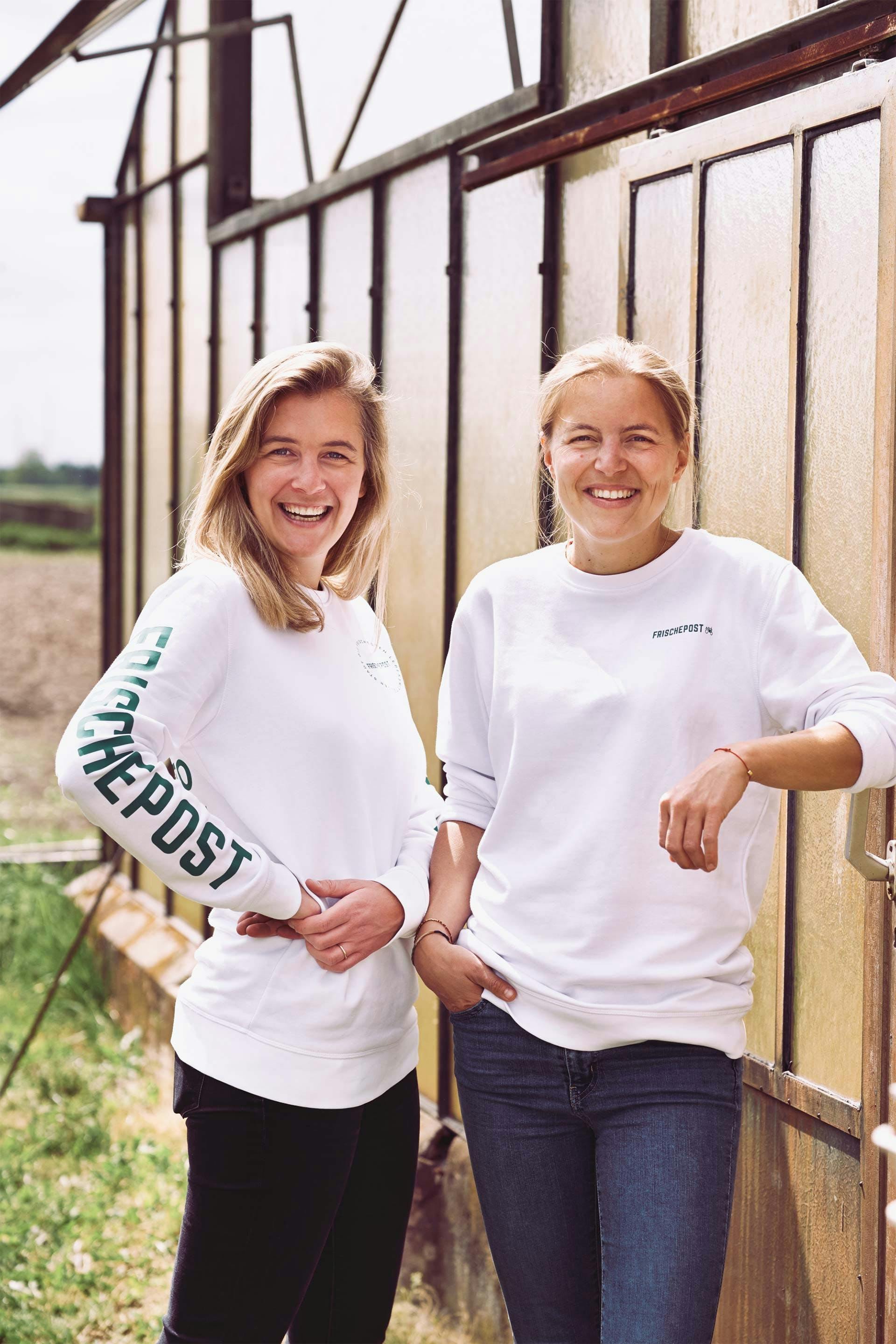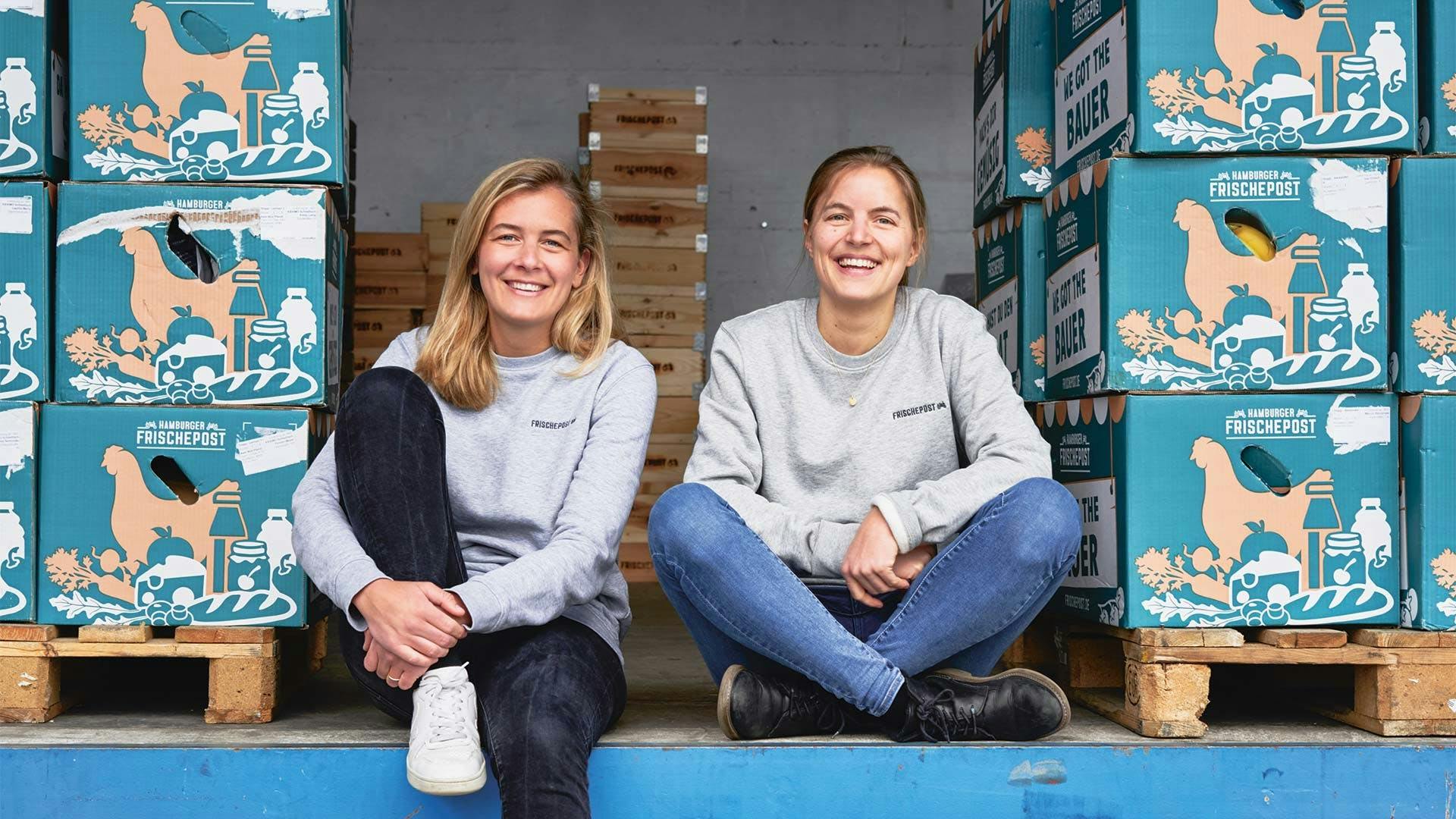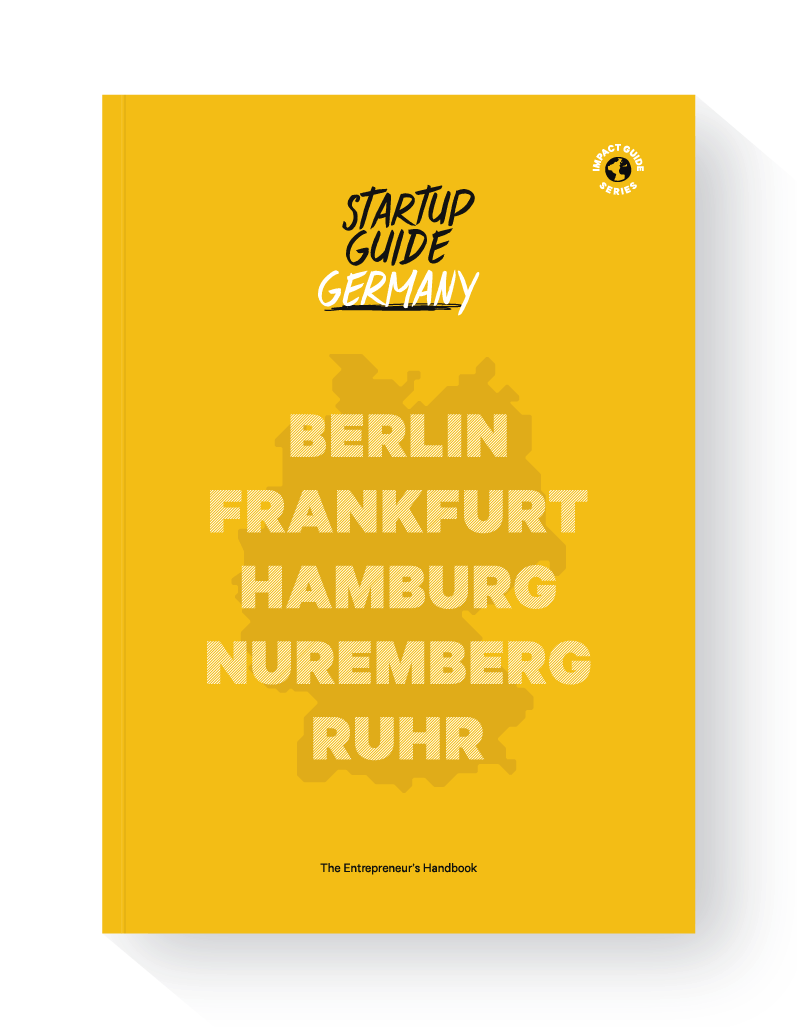Rethinking Germany’s food supply chain: Meet Frischepost cofounder Eva Neugebauer
he daughter of an environmental entrepreneur, Eva Neugebauer has impact entrepreneurship in her DNA. She became convinced of the potential for businesses to effect change during a year studying in the USA, where she gained new insights into politics, society and business.
Eva studied science and business administration at WHU – Otto Beisheim School of Management but was surprised to find impact entrepreneurship wasn’t on the curriculum. To address this, she set up the SensAbility social-entrepreneurship conference, where she met future Frischepost cofounder Jule Willing. The daughter of a farmer, Jule was aware of the difficulties in obtaining a fair price for high-quality, sustainable produce. Realizing direct distribution held the answer but was challenging for farmers to manage, the pair founded Frischepost in 2015.
Frischepost is an online grocery delivery service offering fresh, high-quality produce direct from producer to consumer. Its focus is on sustainability, transparency, best practices and humane animal husbandry. By only supplying based on demand and by creating decentralized, regional food networks, Frischepost aims to reduce food waste and promote mindset change. Eva shares her entrepreneurial path and the obstacles she has encountered founding Frischepost.

Eva Neugebauer. Photo: Franziska Evers
What were the challenges of setting up Frischepost?
There were some things we really wanted to do because we feel it's very important for our sustainable focus. For example, we wanted to do delivery, only with electric cars. And we wanted to do only reusable packaging so we have a deposit system where the customer pays a deposit and, when their packaging is returned, they get a refund.
These two topics were extremely hard for us to execute because there's almost no ecommerce platform on Earth with a deposit system. So that was something we needed to develop, and there are very complex processes behind that.
Electric cars only have a specific range because then you have to charge them again, and it’s hard to lease electric cars in Germany, especially five years ago when we were just starting. These are some of the operational aspects we struggled with and that were very hard to execute – a lot harder than we thought. We needed a lot of fine tuning of the processes, development of some IT tools, that kind of thing.
How did you fund the business initially?
We did it through two grants in the beginning. The first was a German grant called EXIST, which is for innovative startups. We invented and developed a platform that automatizes and digitalizes the complete supply chain, from purchasing of products to last mile, so that was a technical innovation. That's why we got the grant and it made it possible to work for one year on this project.
The other funding we got was the German Social Impact Start scholarship, which provided us with a coworking space, coaching and legal support and all that kind of thing. Then we did a small financing round at the end of 2015.
We are showing that we can do online grocery shopping, online delivery of regional products directly from the farmer to the consumer profitably and sustainably.
How many funding rounds have you completed now?
We've done five seed financing rounds. Our shareholders are mainly business angels and family offices that think long term and want to support a sustainable mission. Now, we are about to complete our Series A financing round with an impact VC from Germany.
How do you plan to use the money? What are the next steps for Frischepost?
Hamburg really serves as proof of concept because we are showing that we can do online grocery shopping, online delivery of regional products directly from the farmer to the consumer profitably and sustainably. And now we’re scaling that up. We're leasing our platform, basically, as a franchise system.
Because we have put a lot of effort into digitalizing the processes, we need to bring products directly from farmers to end consumers in the city. We put everything into that platform, all the knowledge and best practices, and we thought it doesn't make sense that many other agricultural farms, organic box-delivery companies or entrepreneurs in different cities develop that as well because it's expensive, time consuming and you need a lot of patience. So, why not give them that platform?
There are all these kinds of players and entrepreneurs that want to build up something like Frischepost in their area but don't have the money or the resources, or maybe not the knowledge to build such a platform. We also feel that impact-wise it's the best and most effective expansion strategy. It fits our core values because our way is regional products and building up a decentralized structure for getting groceries and not having it centralized like all the big supermarket chains in Germany.
It’s important to say we really turn around the processes that are normal in supermarkets, where they buy products and then try to sell them over the day, or over different days. There is a huge proportion of products that are thrown away because they were not sold. It’s the opposite for us: we get orders from our customers and send them automatically to our producers, who then produce and harvest based on these orders and send and deliver to our warehouse, where we bundle the products. There's pretty much no food waste.
I think that there’s also an important shift of thinking – to get the consumer used to not getting products immediately. Because of that, we can give them fresher products, because they are harvested the same day that you get them and eat them. Also, for nutrition and taste, it's just a different story.

Eva Neugebauer and Jule Willing
Why did you found the company in Hamburg?
My cofounder is from here and Hamburg is a major city. There's a high-density population with a lot of agricultural areas around. It was just one of the three or four cities where we could definitely do it very well.
Tell me about your team. You obviously need a lot of different skills and specializations.
In the beginning, it was only about the Hamburg business, to get operations working. So, people working on logistics, purchasing, all the contacts with the suppliers and building up the assortment of products from different producers. And, of course, the marketing department was important, as was content – we have to create regional and seasonal content every week, talking about products that are in season now. These are the three major areas we had in Hamburg: purchasing, logistics and marketing.
In 2020, we split our team. One part is just still working on Hamburg, and we have a lead for the team here – it isn’t me and Jule anymore – and then we have a team that is only working on the licensing business, to further develop our platform and consult the partners. There is a big tech team with our head of engineering and many developers and product people working on the platform to further develop it.
We also have one team that is responsible for consulting with the different partners that are going to be starting soon, and one team doing central services. So, for example, marketing: we're doing social ads and that kind of thing and brand building, developing the Frischepost brand, doing national campaigns; that's something we do centralized. But there are many things our partners are doing locally, like going to markets and doing neighborhood campaigns to win customers.
Jule and I are also working on finding new founder teams and building up new partners. We’re aiming to have 26 partners in three years, so HR is a big thing; our head of HR is very important.
We really have the vision to make conscious consumption of food a new standard.
And what makes someone a good fit?
It’s very, very important that people are working for the vision. We really have the vision to make conscious consumption of food a new standard, so that’s something that is driving everyone. To really change the structure in Germany, where everything is centralized and you don’t know the story behind the product and it’s just not sustainable, the way we are consuming food.
I would say that everyone on the team is really behind the vision, like 100%, and they are very intrinsically motivated. We are also building up a team based not on hierarchy but on roles. Everyone has a specific role.
For example, the purchasing role or the marketing role, there’s a lot of empowerment there; these people really work with their own ideas and aims. It’s not that we tell them, “Okay, that’s the target and you have to reach it no matter how.” We really work on empowerment and work together to create something that’s worthwhile in the future. This gives me a lot of room to really focus on creative ideas and further developing the company or focus on fundraising, for example.
A version of this article is included in Startup Guide Germany, alongside many more expert insights and useful tips. Order your copy now!
Written by Katherine Williams.
Repackaged by Hazel Boydell.

